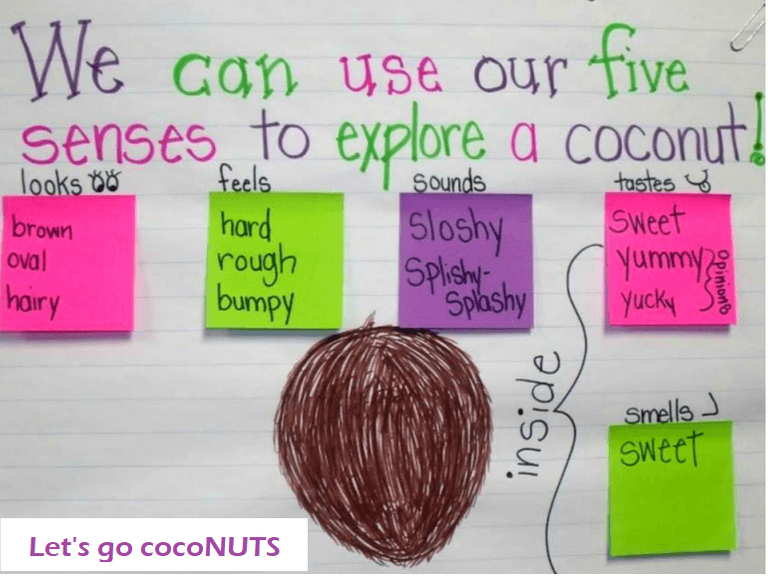It’s time to go cocoNUTS! Did you know that there are tons of different learning activities that can be done with one simple item? Yup, that’s right, get your hands on a coconut and you will have endless lesson plans at hand. Not only is this hairy fruit flavourful and nutritious, it’s the perfect classroom prop too!
While the list of ideas that this food source generates, today I would like to share a learning opportunity that’s mostly focused at primary school children, although, it can be adapted to suit younger and older kids too. It’s time to tickle those senses!

Did you know that we can use ALL five senses to explore a coconut?
This is an excellent sensory activity that includes a bit of STEM too. In this “experiment”, students are given the opportunity to feel, smell, look at, listen to and taste the delicious fruit.
Stimulating the 5 senses:
- Touch: let each child hold the coconut, ask them to write down how it feels. They are likely to mention that it feels hard and hairy. At a later stage, they can take note that the outer coconut is rough, while the inside it the opposite, it’s smooth!
- Sound: Let them shake the fruit next to their ears. A ripe coconut will make a “splashing” sound from within – that’s the delicious milk everyone can soon enjoy!
- Smell: Open the coconut up and pass it around so each kid gets a good whiff of it. Ask them to write down if the liked the smell and what it reminds them of.
- Sight: Next, allow your students to note down their observations, asking them to write down what they see on both the inside and outside of the coconut. To make things more interesting, ask them to make their own drawing of what it is that they see.
- Taste: This is the best part. Chop up the fruit and give everyone a piece to taste. Some will love, some won’t, what’s important is that the give it a go and jot down their tasting experience.
I love this activity for three reasons:
- Kids get to learn through play, which is the best way to learn in my opinion!
- All 5 senses are stimulated, which is wonderful for powering up the brain.
- And last but not least, it is an awesome way to teach children how to observe and then journal their findings e.g. research and analysis.
That's all there is to it! All you need is one ripe coconut and a sharp knife, and there's your lesson! It's enough to keep students busy and involved in the learning activity for a good full hour if you allow them to discuss, share and debate their finding at each sensory stage. Of course you don't HAVE to use a coconut, any fruit will do really, but there is something exotic about this hairy nut that gets the kids curious and eager to explore and discover.

